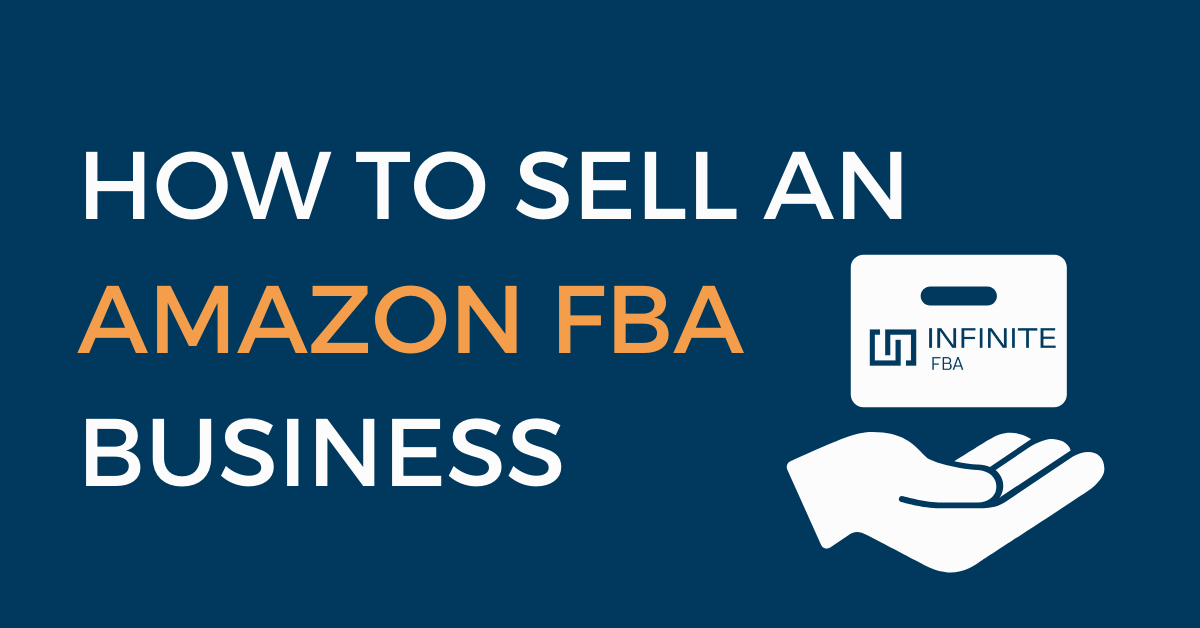With the emergence of the Amazon FBA business model, it was a cause for celebration for anyone selling on Amazon. It meant that the average Amazon seller could now rely upon the powerhouse of Amazon business to handle their products. An Amazon seller could make use of the Amazon distribution network and fulfillment center, giving sellers the opportunity to sit back and focus on their online business.
Due to the net income of some of these Amazon FBA businesses, they quickly become lucrative online businesses. An established brand is a viable asset to sell on to a buyer should you decide to give the business up. But how do you find potential buyers for your business? How do you know that buyer would make an appropriate new owner? Well, let’s get started with the basics.
What is An Amazon FBA Business?
A fulfillment by Amazon (FBA) business is a brand of selling on Amazon com wherein the seller can utilize the full breadth of Amazon warehouses and storage. Opening a business through Amazon is easy, and usually begins through Amazon Seller Central. This resource is the starting point for any Amazon business.
FBA Amazon businesses are just one type of seller account available out of a total of three. The other two include:
- Fulfillment by merchant
- Seller fulfilled prime
All find their start through Seller Central and each has its own set of requirements. With an FBA Amazon business, the seller can choose to outsource their business storage, packaging, and shipping through Amazon itself. The seller account is still in charge of product listings, selling price, brand details, and customer service, but you may save on due diligence costs compared to private warehouses.
A fulfillment by Amazon (FBA) business is desirable for many who sell on Amazon. Outsourcing to a trustworthy third party brand is a key part of any business model. Outsourcing to a behemoth brand like Amazon can be a game-changer. It allows sellers to start selling products they otherwise would not be able to.
FBA sellers must adhere to the following steps for the process to take place:
- The Amazon sellers will provide the necessary products and ship them to the appropriate Amazon warehouse.
- The product to sell is then stored by Amazon until a buyer places an order. Storage fees are decided based upon the size of the product.
- Amazon handles the shipping, sales, returns, refunds, and related buyer customer service.
- The Amazon seller account is credited with the business profits from sales twice per month
From the above information alone, it’s easy to see why so many who sell on Amazon choose to become an FBA Amazon business. However, managing your Amazon business this way isn’t without its drawbacks, which is why many choose to sell.
Can You Sell An Amazon FBA Business?
Yes, and selling a business can be a lucrative pursuit. However, there is a process to go through before you can actually sell your FBA business. Payment terms must be drawn and certain factors will influence finding a new owner, including the amount potential buyers are willing to pay. If you are considering joining the ranks of FBA sellers already out there, read on.
What Type of FBA Business do You Own?
The brand niche your Amazon business falls into can make a surprising difference to the potential buyers you may attract. There are generally three brand categories of eCommerce business operated via Amazon.
Private Label
This form of sales is defined by sellers who possess their own private label brand, but a buyer may find the same product listing elsewhere. It’s often a successful online business to pursue as the private label brings with it an air of brand trustworthiness that customers appreciate. It also often leads to continuous sales, provided the private label businesses maintain solid marketing tactics.
Proprietary Products
Unlike with private label businesses, proprietary brand products are sold exclusively by your business, so competition is nil. For this reason, customers are often willing to pay much higher rates, which makes businesses of this design far more likely to remain in the long term. This also contributes to how valuable the business is to a potential buyer, resulting in a greater business selling price. The net income on these brand products is often highest compared to similar e-commerce online businesses.
Re-seller
By far the most common Amazon business. This relies on the wholesale purchase of products by business owners, which then make a profit for the seller through Amazon. Re-seller FBA businesses are often harder to sell due to their endless product competition, complicated product supply chains, and the lack of products readily available to sell. With due diligence, however, re-seller FBA businesses can prove lucrative.
What is the Annual Net Income of Your Amazon Business?
To sell your Amazon business, you need to know what your business is worth. This is how you can estimate your selling price. Before offering any payment terms, a buyer will want to know your net income. This is usually devised by removing your expenses from your revenue and adding any additional funds.
Expenses generally fall under specific categories, including:
- Amazon fees
- Software payments
- Product shipping services
- Product fulfillment fees
Among others. ‘Additional funds’ may refer to business taxes or a personal business salary you provide yourself. Many of the additions fall under the more personal side of running your Amazon business. However, they have to relate to the Amazon business in a meaningful capacity. Anything that aids the business but isn’t directly used to run the business cannot be counted as additional.
Due diligence regarding your Amazon business accounting is paramount for this very reason. If you ever hope to sell your FBA Amazon business, you will need this information on hand. Otherwise, the prospective new owner will have nothing to base your business-worth from.
How Much is Your Amazon FBA Business Worth?
After completing your due diligence regarding whether your FBA business is marketable, you’ll most likely want to figure out how much your business is worth. Knowing the worth of FBA businesses is difficult, especially with how swiftly the value of products can change. However, there are various tell-tale signs business owners can use to determine how much they may earn as a seller.
First and foremost, business owners should do their research. In recent years, what prices have similar FBA businesses sold for? Think of it as product research and gauge your business price accordingly. You need to be realistic as a business seller. You may believe that your FBA business deserves to sell for millions, but if your business competition isn’t achieving that, then it’s unlikely you will either. What you want to get and what your buyer may expect could be very different. Bear this in mind.
Alternatively to product research, a mathematical way to value your FBA business is by multiplying your annual income from sales by two or three. The amount you arrive at can provide an estimate of how much your FBA business is worth. It isn’t guaranteed that this is the amount your FBA business will sell for, but it gives you some insight.
Note: The buyer and new owner of your FBA business will also be required to purchase all products you presently have in Amazon warehouses. This is in addition to the sale price and is usually explained to the buyer as part of the payment terms.
How Can You Increase the Value of Your Amazon FBA Business?
If you have already worked out how much your FBA business may sell for and you feel somewhat disappointed, don’t worry. There are tactics you can employ to increase the business value prior to any sales. However, there is no immediate fix. Finding the perfect buyer for your sales ambitions won’t happen overnight.
We already discussed the varying types of Amazon business and how much they are likely to sell for. A private label Amazon business will always do better than a re-seller business. There are other factors that may affect the sell value of your business, though.
Age: Older the Site, Better the Buyer
The older your FBA Amazon business, the better it will sell. This is because your products will presumably have enjoyed continuous sales. A buyer will see an older site as needing little renovation. This is especially true for older private label FBA businesses, who will have established a brand for themselves.
Effectively, Amazon business sellers should aim to have hosted their business for at least two years before looking to sell. Anything over three years is ideal. If you have had your Amazon business for less than one year, trying to sell will most likely result in very low offers or no offers whatsoever.
Annual Net Profit: Improve Your Business Sales
The value of any business can be effectively measured by the number of sales it achieves. This is especially true in the eyes of a buyer. The first thing they may look to is the numbers surrounding sales, so you want to make sure your business impresses. Enacting your due diligence in Amazon business accounting is the only way to truly know your net profit. Many businesses have made the mistake of quoting an incorrect number due to false information.
There’s no magic way to improve sales to attract a buyer. However, staying on top of your business, including trends within your niche, can help to boost numbers. You should also stay mindful of customer reviews. To achieve the best seller rank within your business niche, you need to impress the people you sell to. Keep standards high and if a customer has a problem with your product, ensure their complaint is resolved swiftly to avoid a negative Amazon score.
Maintain Product Market Share
How rare are the products that your business sell? Are they available anywhere, or are they sold under your specific brand? These are important questions to answer when trying to sell your business. If the products you sell are available throughout Amazon with no restriction, a buyer is less likely to want your business.
Businesses don’t like enormous competition. If numerous sellers already dominate your business on Amazon, why would a buyer want to join their ranks? The most successful businesses generate sales through scarcity. This can’t be achieved through a saturated market. This is why private label products (e g, products with a brand) are the most sought after by businesses. Perform your due diligence in product research and choose your stock wisely.
Should You Sell Your Amazon FBA Business or Maintain It?
This largely depends on much of the information we have shared above. Is your brand ready to meet a buyer? Or are you still finding your business niche among the swathes of sellers on Amazon com. Before you decide to sell your business, ensure it’s at its peak. That’s the only way to ensure a profit.
Putting business aside for a moment, consider your living circumstances. If you sell your Amazon FBA business, you may achieve a nice sum of money, but if it was your one source of income then this could be the wrong decision. An Amazon business can be a great way to earn continuous revenue. Don’t get sucked into the attractive notion of a large lump sum without thinking it through!
Who Will Buy Your Amazon FBA Business?
This largely comes down to how much your Amazon business is worth. It’s recommended that you work with third party business brokers when it comes to finding a buyer for your Amazon business. There are usually selling fees involved, but it’s a wise investment where business sales are concerned. Working with a broker will reduce the risk of undervaluing your Amazon business.
They will also help with finding a buyer. Knowing the value of your Amazon business is one thing. Knowing how to find a buyer is something else entirely. Brokers can guide you through every step. They will help you to present your Amazon business to any prospective buyer in the best light. They may also promote you through social media. All you need to do is trust the process, which may involve reading a sixteen-page document sent to your email address. No one said sales were easy!
Amazon FBA Market Places to Sell Your FBA Business
So, Are You Ready To Sell an Amazon FBA Business?
It can be a difficult decision to sell your business to a buyer. Often you will have spent a lot of time on social media building your business, which can make you rather attached. However, sometimes it’s more lucrative to let go and move on to other ventures beyond Amazon com.
If you’re interested in continuing with your business, make sure to check out some of our guides on how to build your brand!





